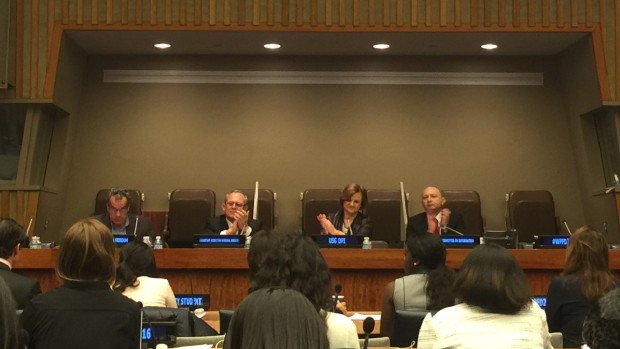
By Longfei Zhang and Helene de Boissiere – Swanson
Saturday, May 7th, 2016
NEW YORK CITY – The Right to be Forgotten which was approved by the European Union has had a global impact on blocking information and expression online across the across the globe. On 13 May 2014, the European Court of Justice (ECJ) ruled that Internet search engines must remove information deemed “inaccurate, inadequate, irrelevant or excessive” for the purposes of data processing, or face a fine[i]. Most recent Google, a USA based company started complying with request.[ii] The ECJ’s decision applies not only to Google but to other search engines operating in Europe, including Yahoo and Bing. However, Google is the only one to notify website administrators when a link to one of their web pages is removed from search results. The struggle for a culture of media freedom, pluralism and independence is essential for press freedom, highlighted in the Windhoek Declaration, adopted 25 years ago. Without a free press journalists cannot collect and report their information safely and independently. And the safety of journalist will ensure the public’s access to impartial information.
纽约市 – 一项被欧盟通过的法案已ç»è¢«é—忘,这项法案对阻ç¢è·¨å›½çš„在线信æ¯å’Œäº¤æµæœ‰ç€å…¨çƒæ€§çš„深远影å“。在2014å¹´5月13日,欧洲法院(European Court of Justice)出于数æ®å¤„ç†çš„目的,规定网络æœç´¢å¼•æ“Žå¿…须移除被认为“ä¸å‡†ç¡®çš„,ä¸å……分的,ä¸ç›¸å…³çš„或者过度的â€ä¿¡æ¯ï¼Œå¦åˆ™å°†ä¼šé¢ä¸´ç½šæ¬¾[i]。è·ä»Šæœ€è¿‘是谷æŒï¼ˆGoogle),一个美国ä¼ä¸šå¼€å§‹éµä»Žè¦æ±‚ [ii]。欧洲法院的决定ä¸ä»…仅适用于谷æŒï¼Œè¿˜é€‚用于其他在欧洲è¿è¥çš„æœç´¢å¼•æ“Žï¼ŒåŒ…括雅虎(Yahoo)和必应(Bing)。然而,谷æŒæ˜¯å”¯ä¸€ä¸€ä¸ªåœ¨ç§»é™¤äº†æœç´¢ç»“æžœä¸çš„链接åŽï¼Œé€šçŸ¥å¯¹åº”网站管ç†å‘˜çš„å…¬å¸ã€‚针对媒体自由ã€å¤šå…ƒæ€§ã€ç‹¬ç«‹çš„æ–‡åŒ–çš„æ–—äº‰æ˜¯æ–°é—»è‡ªç”±çš„å…³é”®å› ç´ ï¼Œåœ¨25å¹´å‰æ£å¼é€šè¿‡çš„温得和克宣言(Windhoek Declarationï¼‰ä¹Ÿå¾—åˆ°äº†å¼ºè°ƒã€‚å¦‚æžœæ²¡æœ‰è‡ªç”±çš„æ–°é—»çŽ¯å¢ƒï¼Œé‚£ä¹ˆè®°è€…å°±æ— æ³•å®‰å…¨ç‹¬ç«‹åœ°æ”¶é›†ä¿¡æ¯å’ŒæŠ¥é“。并且记者的人身安全ä¿è¯äº†å…¬ä¼—能获å–到公æ£çš„ä¿¡æ¯ã€‚

Said Essoulami, President, Centre for Media Freedom in the Middle East and North Africa
Frank La Rue, Assistant Director-General for Communication and Information, UNESCO
Cristina Gallach, Under-Secretary-General for Communications and Public Information
H.E. Kaha Imnadze, Permanent Representative of Georgia to the United Nations and Chairman of the General Assembly Committee on Information – Said Essoulami,ä¸ä¸œå’ŒåŒ—éžåª’体自由ä¸å¿ƒä¸»å¸ï¼›Frank La Rue,è”åˆå›½æ•™ç§‘æ–‡ç»„ç»‡ä¼ æ’和信æ¯éƒ¨é—¨åŠ©ç†æ€»å¹²äº‹ï¼›Cristina Gallachï¼Œä¼ æ’与公共信æ¯éƒ¨é—¨å‰¯ç§˜ä¹¦é•¿ï¼›H.E. Kaha Imnadzeï¼Œæ ¼é²å‰äºšå¸¸é©»è”åˆå›½ä»£è¡¨å’Œä¿¡æ¯å§”员会主å¸ã€‚图片æ¥æºï¼šå¼ 龙飞 Photo Credit: Longfei Zhang
This past May 5th, World Press Freedom Day 2016Â
[iii] , a large group gathered at the United Nations in New York City to address a number of concerns facing journalist today. “We are not the enemy, but we are here to help because gathering information and giving true and objective information can only strengthen societies and I think that is something that I would really like to see high up on the agenda of Press Freedom Day and beyond.†Christiane Amanpour, CNN chief International Correspondent stated earlier in the week, “We are not the enemy, but we are here to help because gathering information and giving true and objective information can only strengthen societies and I think that is something that I would really like to see high up on the agenda of Press Freedom Day and beyond.†The message coming out of the UN World Press Freedom Day 2016 in short: to protect journalists and combat impunity. When a problem is global, it calls for a global response. The scale and number of attacks on journalists and media workers around the world, combined with failures to investigate and prosecute crimes against them, have each contributed to the unacceptably high level of personal risk that journalists and others continue to face simply for exercising their right to free expression. In response, the United Nations has developed an approach called the UN Plan of Action on the Safety of Journalists and the Issue of Impunity.
在过去的5月5å·ï¼Œ2016年世界新闻自由日[iii],一大群人èšé›†åœ¨ä½äºŽçº½çº¦å¸‚çš„è”åˆå›½é’ˆå¯¹ä¸€ç³»åˆ—当今记者的关注点å‘表演说。“我们ä¸æ˜¯æ•Œäººï¼Œæˆ‘们是在这里æä¾›å¸®åŠ©ï¼Œå› ä¸ºæ”¶é›†èµ„æ–™å’Œæ供真实客观的信æ¯æ‰èƒ½å·©å›ºç¤¾ä¼šï¼Œè¿™æ‰æ˜¯æˆ‘真的想看到的超越新闻自由日日程的结果。â€Christiane Amanpour,CNN首å¸å›½é™…通讯记者在这周å‰å‡ 天指出。简而言之,从è”åˆå›½ä¸–ç•Œæ–°é—»è‡ªç”±æ—¥ä¼ é€’å‡ºçš„æ¶ˆæ¯ï¼šä¿æŠ¤è®°è€…和打击有罪ä¸ç½šã€‚当一个问题是全çƒæ€§çš„,那么就需è¦å…¨çƒçš„å“应。在世界范围内,攻击记者和媒体工作者的规模和数é‡ï¼ŒåŠ 上阻ç¢è°ƒæŸ¥å’Œå过æ¥æ£€ä¸¾è®°è€…çš„è¡Œä¸ºï¼Œéƒ½åˆ†åˆ«å¯¹ä¸ªäººé€ æˆäº†ä¸å¯æŽ¥å—的高风险,仅仅是当记者和其他新闻工作者想继ç»è¡Œä½¿è‡ªç”±è¡¨è¾¾çš„æƒåˆ©ã€‚作为回应,è”åˆå›½å·²ç»å¼€å‘出一个被称为《关于记者安全和有罪ä¸ç½šé—®é¢˜çš„行动计划》的方案。
The UN Plan of Action
[iv] is designed to include all stakeholders. It incorporates roles for governments, non-governmental organizations, academics, the media, and others working at global, regional, national and local levels. It’s success will depend on the full participation of all by raising awareness among citizens about the consequences when journalists have their right to free expression curtailed. It is also essential to assist governments develop and implement laws to safeguard journalists and deal with the problem of impunity. The implementation of provide training courses for journalist and promote good working conditions for journalists, including freelance journalists, and to establish the strengthening of the safety of journalist in conflict zones.
《è”åˆå›½è¡ŒåŠ¨è®¡åˆ’》[iv]是为包å«æ‰€æœ‰åˆ©ç›Šç›¸å…³è€…而设计的。它引入了很多åˆä½œè§’色,包括政府,éžæ”¿åºœç»„织,å¦æœ¯ç•Œï¼Œæ–°é—»ç•Œå’Œå…¶ä»–工作在全çƒï¼ŒåŒºåŸŸï¼Œå›½å®¶å’Œå½“地范围的机构。它的æˆåŠŸå°†ä¼šä¾èµ–于所有人的全力å‚与,通过æå‡å…¬æ°‘关于记者被剥夺自由表达的åŽæžœçš„æ„识。å助政府å‘展和实施ä¿æŠ¤è®°è€…和处ç†æœ‰ç½ªä¸ç½šçš„法律也是å分关键的。给记者æ供培è®è¯¾ç¨‹ï¼Œå¹¶ä¸”æå‡ä¼˜è‰¯çš„办公环境,包括自由记者,åŒæ—¶åœ¨å†²çªåœ°åŒºåŠ 强记者的安全ä¿æŠ¤ã€‚
To check out the implementation strategy and join international efforts to make it work and promote multi-stakeholder consultative processes in your country to adapt the UN Plan to your local needs. UNESCO has published guidelines to help you with this process. Subscribe to the UNESCO Newsletter on the Safety of Journalists to follow the UN Plan´s implementation and developments. Apply UNESCO’s Journalists’ Safety Indicators to assess the situation for journalists in your country. Create a baseline and then follow-up to establish trends. There are guidelines to help you with the Indicators. For more information, consult: • UN Plan of Action webpage • UN Plan of Action • UN Inter-Agency meetings on the safety of journalists • UN Plan of Action Newsletter • Guidebook: Operationalizing the UN Plan at the country level (PDF) • UNESCO’s Journalists’ Safety Indicators
获å–实施ç–ç•¥å’ŒåŠ å…¥å›½é™…åŠ›é‡ä½¿ä¹‹å®žçŽ°ï¼Œå¹¶ä¸”åœ¨ä½ æ‰€åœ¨çš„å›½å®¶æå‡å¤šæ–¹é¢åˆ©ç›Šç›¸å…³è€…的咨询æµç¨‹æ¥ä½¿ã€Šè”åˆå›½è®¡åˆ’》适应于当地的需求。è”åˆå›½æ•™ç§‘文组织已ç»å‘表了指å—æ¥å¸®åŠ©ä½ 了解这个æµç¨‹ã€‚订阅è”åˆå›½æ•™ç§‘文组织关于记者安全的新闻邮件,å¯ä»¥æŒç»å…³æ³¨åˆ°ã€Šè”åˆå›½è®¡åˆ’》的实施和å‘展。应用è”åˆå›½æ•™ç§‘文组织的记者安全指示æ¥è¯„ä¼°ä½ æ‰€åœ¨å›½å®¶çš„è®°è€…å¤„å¢ƒã€‚åˆ›ç«‹ä¸€ä¸ªåŸºå‡†å¹¶ä¸”è·Ÿè¿›æ¥å»ºç«‹è¶‹åŠ¿ã€‚这里有一些指å—æ¥å¸®ä½ 了解指示。获å–更多信æ¯ï¼Œè¯·å’¨è¯¢ï¼šâ€¢ã€Šè”åˆå›½è¡ŒåŠ¨è®¡åˆ’》网页 •《è”åˆå›½è¡ŒåŠ¨è®¡åˆ’》• è”åˆå›½æœºæž„间关于记者安全的会议 •《è”åˆå›½è¡ŒåŠ¨è®¡åˆ’》新闻邮件 • 指导手册:在国家层é¢å®žæ–½ã€Šè”åˆå›½è®¡åˆ’》(PDF)• è”åˆå›½æ•™ç§‘文组织的记者安全指示



